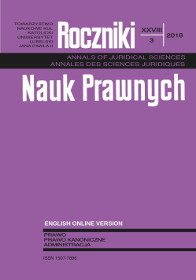Introduction of the Concept of an Independent Central Bank into the Polish Political System in Light of the European Experience
Introduction of the Concept of an Independent Central Bank into the Polish Political System in Light of the European Experience
Author(s): Remigiusz Chęciński, Michał PrzychodzkiSubject(s): Law, Constitution, Jurisprudence, Civil Law
Published by: Towarzystwo Naukowe KUL & Katolicki Uniwersytet Lubelski Jana Pawła II
Keywords: central bank; independence; monetary policy; staffing of bank authorities
Summary/Abstract: The article is intended to outline the development of central banking in terms of its independence, with particular emphasis on the implementation of the idea of an independent central bank in Poland, also comparison with some other countries. The idea of central-bank independence was presented from personnel, financial and functional perspectives. In the initial phase of their development, central banks were mainly established in the form of capital-based companies. Their position and importance was determined by special privileges. The Maastricht Treaty was a normative act that had a major influence on the shape of the currently dominant concept of an independent central bank, which pursues a free monetary policy at its own discretion. The Constitution of 1997 and the Act 29 August 1997 on the National Bank of Poland of were crucial in guaranteeing the strong position and independence of NBP from state authorities.
Journal: Roczniki Nauk Prawnych
- Issue Year: 28/2018
- Issue No: 3EV
- Page Range: 5-19
- Page Count: 15
- Language: English

